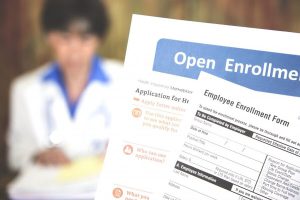What You Need to Know About Open Enrollment: Yes, it’s a Big Deal!
Nothing keeps West Virginians up at night like the cost of health care. And with the rising prices of food, rent and child care, too many families are left worrying about how to pay the bills and make ends meet. And to add insult to injury, health care costs perennially outpace inflation and all other staples we depend upon to live.
I don’t know about you, but I don’t think West Virginians — or any citizen of the United States of America — should have to fund their chemotherapy through a GoFundMe campaign.
Or risk the roll of the dice that they will remain healthy and skip health insurance coverage altogether because they think they can’t afford it.
No one plans to get sick or hurt, but most people need medical care at some point. Most of us understand that meaningful health care coverage is critical to living a productive, secure and healthy life. If you have not had firsthand experience with this fact of life, well, all I can say is congratulations.
Despite recent gains, more than 28 million individuals still lack coverage, putting their physical, mental and financial health at risk. However, the proportion of people without health insurance varies dramatically across states, from a high of 17.7% in Texas to a low of 2.8% in Massachusetts. Approximately 6.8% of West Virginians — roughly 107,000 residents — are uninsured.
West Virginia has the 34th highest share of the uninsured population in the United States.
How do we fix this?
Enrollment in ACA Marketplace Plans for 2023 Begins on Nov. 1. The annual open enrollment period is a set window of time when you can enroll in various major medical health insurance or ACA-compliant health insurance plans. During this time, not only can you sign up for health insurance, you can also adjust your current plan or even cancel it.
If you don’t have health insurance through a job, Medicare, Medicaid, the Children’s Health Insurance Program (CHIP) or another source that provides qualifying health coverage, you can find coverage through the Marketplace.
In addition to making critical investments to fight the pandemic, the American Rescue Plan and the Inflation Reduction made health care premiums more affordable for millions of Americans who purchase insurance on their own, including thousands of families in West Virginia, of which I am one.
In West Virginia alone, 23,037 enrolled in quality coverage and are receiving the advance premium tax credits. For so many, this access to care means the peace of mind knowing that a medical emergency will not result in bankruptcy. I personally know West Virginians who filed bankruptcy because of staggering medical bills.
Open Enrollment runs from Nov. 1 through Jan. 15
- Enroll by Dec. 15 for coverage that starts Jan. 1
- Enroll by Jan. 15 for coverage that starts Feb. 1
Your savings depend on your expected household income for the year. You may qualify for a premium tax credit that lowers your monthly insurance bill, and for extra savings on out-of-pocket costs like deductibles and copayments.
By guaranteeing coverage that costs less than 8.5 percent of household income, the American Rescue Plan’s tax credits (passed in 2021) allowed millions of enrollees to find a quality plan for $10 or less per month and saved families an average of $2,400 a year on our insurance premiums.
All Marketplace plans cover:
- 10 essential health benefits, including prescription drugs, emergency services, hospitalization, laboratory services and mental health and substance use disorder services
- Free preventive health services at no cost to you when delivered by a doctor or provider in your plan’s network
- Coverage for pre-existing conditions
Here are some tips to get ready for open enrollment:
- Shop early: Don’t wait until the last minute. Start researching your options and comparing plans ahead of time.
- Assess your needs: Take a closer look at your health care needs and any changes in your life that might affect your coverage requirements.
- Review your current plan: Examine your existing plan to see if it still meets your needs or if it’s time to explore new options.
- Explore available plans: Check out different plans offered by your employer or the marketplace to find the best fit for you.
- Consider cost vs. coverage: Evaluate the balance between monthly premiums, deductibles, copays and coverage to make an informed decision.
- Seek expert advice: If you’re unsure about which plan is right for you, don’t hesitate to ask for guidance from an insurance expert like a WV Navigator.
- Factor in family needs: Consider your family’s health requirements when choosing a plan to ensure everyone’s covered.
- Review in-network providers: Make sure your preferred health care providers are in the plan’s network to avoid unexpected out-of-pocket expenses.
- Understand plan changes: Stay informed about any changes to your current plan, including benefits and costs.
- Set reminders: Mark important dates on your calendar, such as the start and end dates of open enrollment, to avoid missing deadlines.
Yes, it is a bit complicated and even intimidating — but you don’t have to go it alone. Investing time in assessing what plan best fits your and your family’s needs could save you thousands of dollars and exponentially increase your access to the appropriate resources and care.
There are several ways to apply for and enroll in Marketplace health coverage:
- Call WV Navigator — A free non-profit program available to all in-state residents that provides free enrollment assistance — at 1-844-WV-CARES/1-844-982-2737 or visit ACANavigator.com
- Use HealthCare.gov to apply online
Common mistakes to avoid during open enrollment
- Waiting too long
- Not assessing your needs, and those of your family
- Ignoring plan details
- Skipping preventive care
- Forgetting to update information
- Underestimating costs
It is important to understand the changes in open enrollment as they are genuinely transforming access to coverage for millions, including tens of thousands of West Virginians.
Some of the signature improvements to the ACA include: expanded options that include plans with broader coverage and more choices; enhanced telehealth services; lower premiums; updated prescription drug coverage; expanded provider networks making it easier to see our preferred doctor, including specialists; more preventive services; and user friendly digital enrollment platforms making it easier to enroll from your home.
Healthy people make healthy communities and economies. I’ve seen it. I live it. Studies — and common sense — confirm that health care coverage improves access to care, supports positive health outcomes, including an individual’s sense of their own health and well-being; incentivizes appropriate use of health care resources; and reduces financial strain on individuals, families and communities. This is good news for West Virginians.

